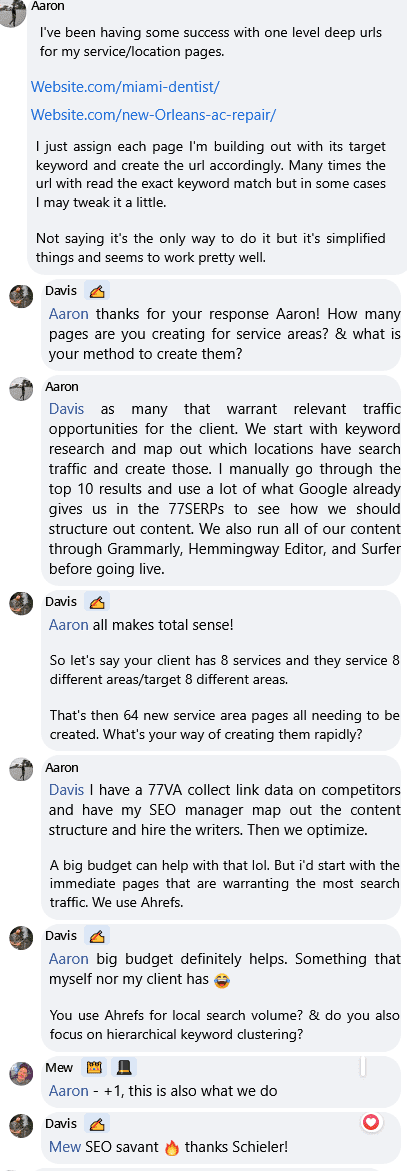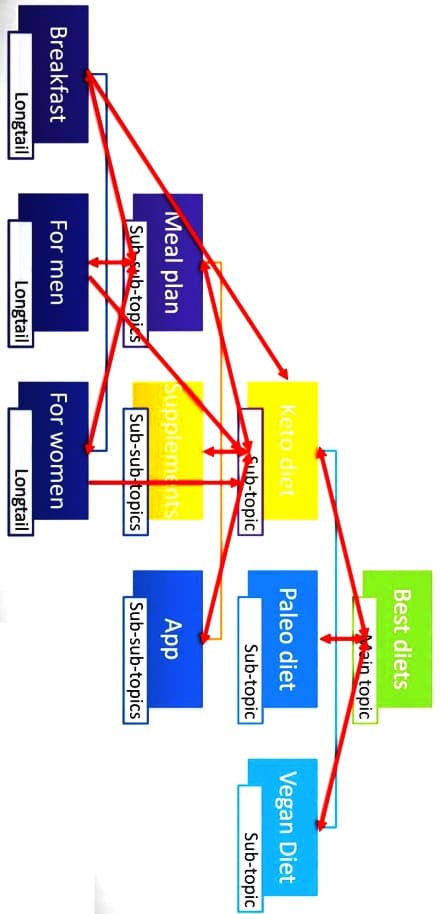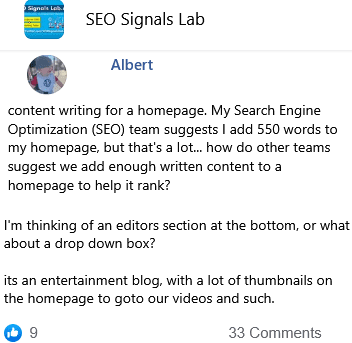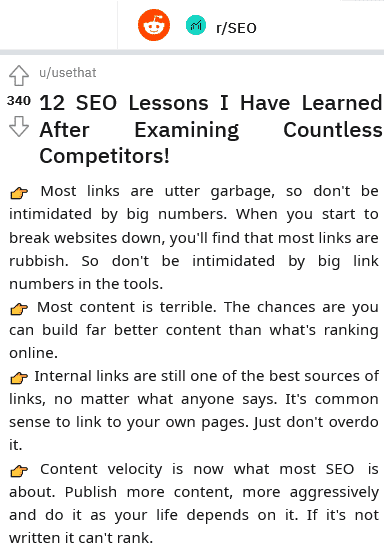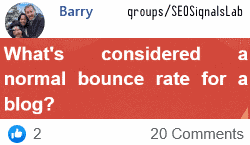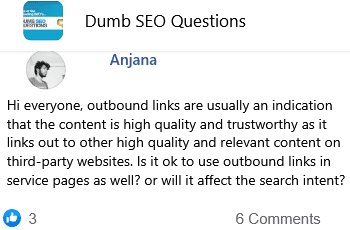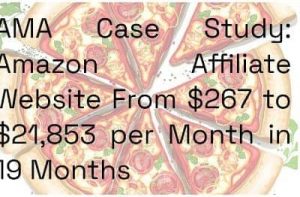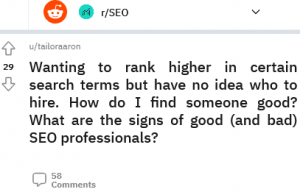Hello everyone! This has become my favorite Facebook group for learning Search Engine Optimization (SEO), so I appreciate all of your positivity and willingness to help one another.
I wanted to ask a question about service location pages and potential negatives that could happen since I'm building out around 175 Dynamic pages using Wix (this is what the client is already using).
So far, I have created an overall "Areas We Serve" page, so we'll call this
https://examplesite.com/areas-we-serve/This page is simply a page that will house all of the "Area" pages for the "Service Provider In Area" pages. The pages will look like this:
https://examplesite.com/areas-we-serve/area1https://examplesite.com/areas-we-serve/area2https://examplesite.com/areas-we-serve/area3From these links ^ I then created & linked each "Area" page to their respective "Service Provider in Area" pages, so for further example, we'll say "Carpenter in *Area*" is what I'm going for. Here are the links:
https://examplesite.com/carpenter-area1https://examplesite.com/carpenter-area2https://examplesite.com/carpenter-san-diegoEach area will then have it's own collection of service pages, which will look like this:
https://examplesite.com/carpenter-san-diego/drywallhttps://examplesite.com/carpenter-san-diego/fencinghttps://examplesite.com/carpenter-san-diego/shelvingMy question is, would it be better to use a URL that looks like the ones directly above? Or would it be better/is it dangerous to use this:
https://examplesite.com/carpenter-san-diego/drywall-in-san-diegohttps://examplesite.com/carpenter-san-diego/fencing-in-san-diegoLastly, if I created another collection of pages, would it be too much redundancy to Google if I used this format? Or should I also include pages for the following?
https://examplesite.com/drywall/area1https://examplesite.com/drywall/area2https://examplesite.com/drywall/area3I just want to have the most pages possible to completely beat out competitors while also making sure I'm not doing anything "Grey" or "Black" to drop rankings. If you've read this far, thank you so much for your time!
I appreciate the feedback if this post is approved! 🙂
3 👍🏽3
24 💬🗨
📰👈
I've been having some success with one level deep urls for my service/location pages.
I just assign each page I'm building out with its target keyword and create the url accordingly. Many times the url with read the exact keyword match but in some cases I may tweak it a little.
Not saying it's the only way to do it but it's simplified things and seems to work pretty well.
Thanks for your response Aaron! How many pages are you creating for service areas? & what is your method to create them?
Aaron » Davis
As many that warrant relevant traffic opportunities for the client. We start with keyword research and map out which locations have search traffic and create those. I manually go through the top 10 results and use a lot of what Google already gives us in the Search Engine Result Pages (SERP)s to see how we should structure out content. We also run all of our content through Grammarly, Hemmingway Editor, and Surfer before going live.
Davis ✍️ » Aaron
All makes total sense!
So let's say your client has 8 services and they service 8 different areas/target 8 different areas.
That's then 64 new service area pages all needing to be created. What's your way of creating them rapidly?
Aaron » Davis
I have a Virtual Assistant (VA) collect link data on competitors and have my SEO manager map out the content structure and hire the writers. Then we optimize.
A big budget can help with that lol. But i'd start with the immediate pages that are warranting the most search traffic. We use Ahrefs.
Davis ✍️ » Aaron
Big budget definitely helps. Something that myself nor my client has 😂
You use Ahrefs for local search volume? & do you also focus on hierarchical keyword clustering?
Mew 👑🎩 » Aaron
1, this is also what we do
Davis ✍️ » Mew
SEO savant 🔥 thanks Schieler!
💟
📰👈
Truslow
The methods you describe all still work, for now, anyway. But there's a way that doesn't mean creating a zillion extraneous pages, is far more easier to manage, and will product the same results. Plus, I suspect that by the end of the year, sites still using this method are going to have more and more of the "crawled not indexed" problem that has been reported so often over the past few months.
Google understands location. Very well. As such, all you really need to do is the following… set up your Google My Biz (GMB) listing with your service areas listed in there. Set up your Business Schema on your web site the same way – making sure to clearly define your service area.
Then, create the service pages – listing your service areas on each one, but not bothering to focus on any one area. Make sure it's got Service Schema that is well laid out and also contains the area served list. Flesh out those pages and make sure they are clear and complete. Above – you mentioned "Drywall" for example – what does that mean? These are the things Google doesn't understand – does that mean installing it? Patching it? Replacing it? Describe all that on the page.
The schema and Google's understanding of locations will make that one Drywall page rank just as well for each of the areas you serve as the individual pages. The great thing is that Google also understands a lot more about locations if we're hooked in the knowledge graph and not just trying to play the "match up the keywords" game.
You might have a "San DIego" service area and do drywall, so if you do your method you'll rank fine for "Drywall San Diego" but – what about "Drywall Mission Beach" or "Drywall Point Loma"? Are you going to make individual pages for every section and neighborhood of every city? If you tie into the KG the way I described above, that Knowledge Graph works for you and your same drywall page will rank for those terms and any other section, neighborhood, or term that someone might regularly use to describe the area.
Now… EVENTUALLY Google will probably figure out what your zillion location/service combo pages mean and hook them into the knowledge graph anyway. But this can take months – and up to a year if you have a ton of services and towns. And then if you add a new service or location – that location, because it's just a bunch of keywords on a page at this point – is going to take its own 6 months for Google to figure it out and rank it properly for anything other than the words that appear on the page. With the method described above – add a new service and Google just needs to figure out what that service is and it is ready to rank it in all the areas you service. Add a new town, and Google just needs to connect all the services it has and you'll be in there. This takes "weeks" – not "months" to figure out.
Sure… it can still help to work it the other way too – have a 'San Diego" page that lists all the services just like you have an individual service page that lists all the locations. That makes sense for users, too – though. Someone lives in that town, so they want to see a list of all the services you have for them. This is more important if services vary in some cities, but I still find it helpful. And it limits you to just one page for each service, one page for each town, and structured data to connect it all as opposed to 90 pages with links and things that algo has to analyze in order to learn the exact same thing.
Thank you so much for the extremely thorough answer Stockbridge 🔥🙏🏾
How do you recommend including the service areas in the Google My Biz (GMB)? By use of the description? Should I focus on just including as many service areas in there as possible?
I haven't done anything business schema related, so I will work on that next ASAP!
Do you recommend focusing on neighborhoods instead of just areas and towns as well?
And if you don't mind me asking, do you foresee the "service pages" method becoming a completely irrelevant ranking factor in the future? Or just decreasing in effectiveness but still a good practice to use?
I'm not sure if having more pages than competitors is a guarantee to outrank them, so I would love to stay ahead of the curve 💯
Truslow
I put my Business – be it Organization, LocalBusiness, or one of the more specific ones if applicable, on every page of the web site since everything on the business web site relates to that business. Every page, in one way or another is about the business. So yes… I'd start there.
And yes… I do see the "Zillion Service/Location Combo Pages" strategy going away. Probably this year – if not, then next year. Here's the reasoning behind my thoughts on that.
It's not so much that the strategy can't or won't work – it's that Google won't give you the full representation to execute it.
If you've been playing along at home here in the SEO groups over recent months, around December or so, people started complaining about a lot of pages being "crawled, not indexed." A lot of theories came about what it is – being part of the Spam update (and that actually is part of it) along with glitches at Google (not the answer) and many others.
As time goes by we are realizing that it is something where Google wants a few things settled before it is willing to index and rank a page. First, it wants to understand a bit about what the page is about. Once it figures that out, it wants to see if it offers something unique or different at some level – not just different words, but something unique. This is especially important on your own site, but at some levels it might appear that it needs to offer something special across other sites too. The jury is still out on that one.
Basically, Google is changing from "indexing the entire web" to "bringing you what you want from the web." And frankly, if it's garbage or you've already said basically the same thing on another page, then it's not going to bother even indexing the new page that uses a minor keyword variation. It'll just rank the original page. No need for the other one, it's redundant.
Now.. if you are playing the "Get Links, Optimize Keywords and Match the Keywords to Rank" game (which is the game you're playing when you do the "Location/Service" combo pages) Google doesn't have a lot to go on except the links coming in and the words on the page. And, even if you say it in different words – you're "Plumbing – Dallas" and "Plumbing – Austin" pages are really going to be saying almost the same thing. The only REAL substantial difference is Dallas and Austin. And at some point, Google is going to start realizing, I don't need all those pages.
This is a very oversimplified explanation as time is short, but… in a nutshell – yeah. As Google expands its "quality over quantity" campaign this year, these "1000 pages that could do the same thing with just 5-6 pages" strategies are going to die off. Not because the pages couldn't rank if they were indexed, but because Google isn't necessarily going to want to index them all in the first place.
Davis ✍️ » Truslow
Seriously Stockbridge, thank you so much for your time!
So include business schema on every single page of the website – got it loud & clear. 🙂 I will focus on this today!
How do you recommend optimizing the Google Business Profile? Do you believe it's valuable to use the "posting" feature in order to increase rank and lead conversions?
And if it's no longer the Location/Service combo pages that allow for SEO users to get an advantage over other listings, what's left for us to do On-Page wise and in general that can increase ranking & conversions other than adding Local Business Schema? Should I focus on backlinks at this point?
📰👈
Truslow
Service Schema is critical for services. Think of it like Product Schema, but your product is the service. No… Google (for the most part) doesn't have enhanced listings for services, but it does help draw that line from Exactly WHO does WHAT and WHERE they do it. So, when people are looking for that, your site and/or map pack listing will turn up.
It's important to get into the nitty gritty on your services too. It's not just plumbing, but a bullet list of the specific services – drain unclogging, pipe repairs, toilet replacement, etc. People don't always search for a "Plumber" they often search for "toilet repair" or something specific to their own exact need. So, the site that best explains that – and connects it all back to the brand/service provider – is the one that's going to top the searches best.
Again… Google pwns the whole "location" thing. They've been doing the map thing for a LONG time. They know where things are. The trick is to get Google to understand what those things actually do or provide so it can serve it up to the people in those areas.
As for GMB postings helping ranking – I don't think there is a direct correlation to "posts equals higher ranks" but there are some things it can surely help with. A restaurant posting that they have home made New England Clam Chowder this week is going to get people who are looking for Clam Chowder. Describing things you do in a post can sometime help Google expand it's understanding of your services. So if your plumber site posts about this tricky tie in to the city water main, Google can know that that is something else you are capable of – even if it's not mentioned on the site. So… you can rank for it.
So… it's not so much about improving ranking, IMO, it's more about "what" you are going to be ranking for in the first place.
Davis ✍️ » Truslow
Thank you so much for the education Stockbridge! I seriously can't thank you enough and I hope others in this group are able to benefit from your wealth of knowledge in this post as well.
So one services page that links out to other service pages (non-area, just service) with built out lists, information and opt-ins should be enough to build a strong foothold on ranking for the most valuable keywords?
Totally understand the "What" part too. I guess I'm just no longer sure about what "active" steps I can take to increase traffic and conversions as much as possible…that's all I really want to focus on 🙂
Do you mind me asking what other steps I can take to be more on the offensive with SEO today?
Truslow
Make sure the service areas are "listed" on the service pages – as well as in the schema – but correct.
And you CAN have some benefit from having some location pages. San Diego – and then list ALL the services on one page that are available for the city. This is useful for users too – because they sometimes need more than one thing so like an HVAC company would be handy to know you can service San Diego with heating AND cooling AND auto recharging, AND everything else. They may not want it now, but it sticks in their minds if they see the list.
The point is to not need a zillion city/individual service pages. They just aren't necessary.
As for other things to help with Search Engine Optimization (SEO)… it's hard to say. There's no checklist or magic bullet. To really optimize everything, a unique strategy needs to be developed for each client. If you work from a list, you're only going to help the things that happen to be on that list. Some folks need some time spent on reputation management, others have issues with ambiguity (meaning that their brand and or products services are confusing). Each client has a different strategy.
I can say that "You need to make it make sense to Google (and your users)" is the prime directive right now. Here's a great 30 minute video on making sense out of the chaos. A bit of it might be stuff you already know, but the end talks a lot about writing copy in ways that Google can understand rather than just match the keywords. It's a few years old now, but the info is still all good – except maybe the stuff about AMP is a bit dated. lol
Jason Barnard – How to Help Google Make Sense of a Chaotic, Unstructured Web #SEOisAEOJASONBARNARD.COM
Jason Barnard – How to Help Google Make Sense of a Chaotic, Unstructured Web #SEOisAEO
Davis ✍️ » Truslow
You are truly incredible Stockbridge. Everything you said makes sense. Seriously.
Can I DM you in the future for additional help?
Truslow
If I'm doing it for free – I like to do it out in public so other folks can learn. One-on-one direct consults is how I make my living. 😉
Davis ✍️ » Truslow
Not a problem at all! Great to know 😁 hope to be able to pay it forward like you someday!
Kyle
I think you are complicating it … keep it simple. Users like simple and focus on whats logical
Thanks Kyle! Tbh I'm not really asking about users on this question tho, as I guess this pertains more to what Technical items could be potential ranking factors aside from just User Interface (UI), User Experience (Ux), Conversion Rate Optimization (CRO) 🙂.
I'm concerned here about keywords, schema markup (has nothing to do with Users), and communicating any information I can give to Google in order to receive a cutting edge over the competition!
I agree tho, for the UIUXCRO aspect that simple and user friendly is always key 🔑 thanks for your feedback Kyle!
📰👈
an SEO Analyst Believes 301 redirection of an URL to the Same Slug Retains the Full Pagerank
Has Single Post Pagination got a portion of On-Page SEO?
Someone has Lost the Vast Majority of Rankings after Switching Hosts
SEO and URL Redirection for Expired Domains

